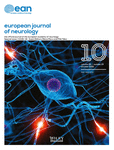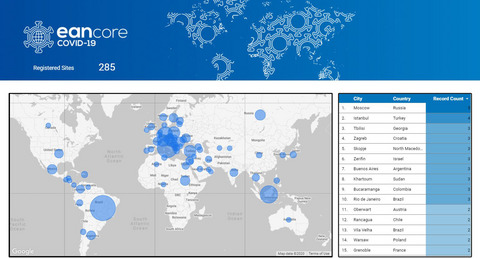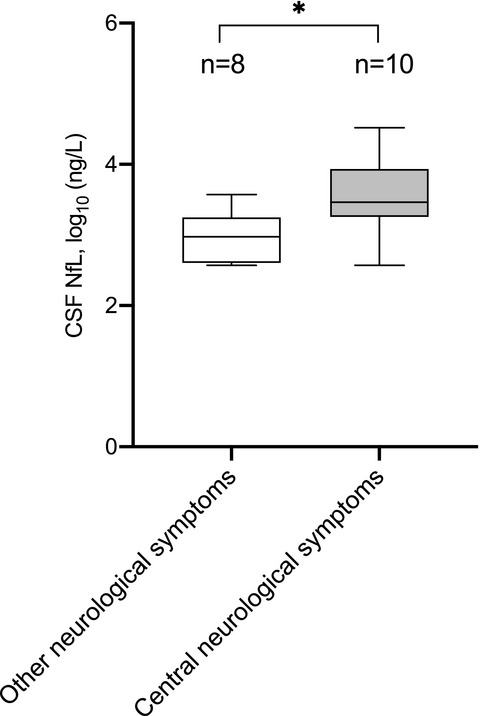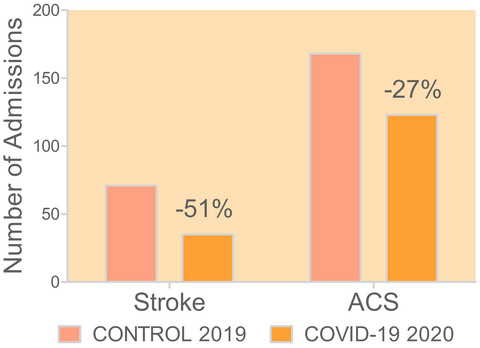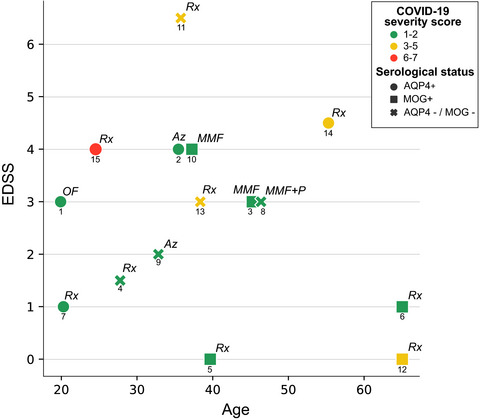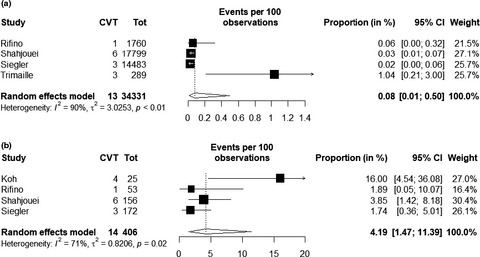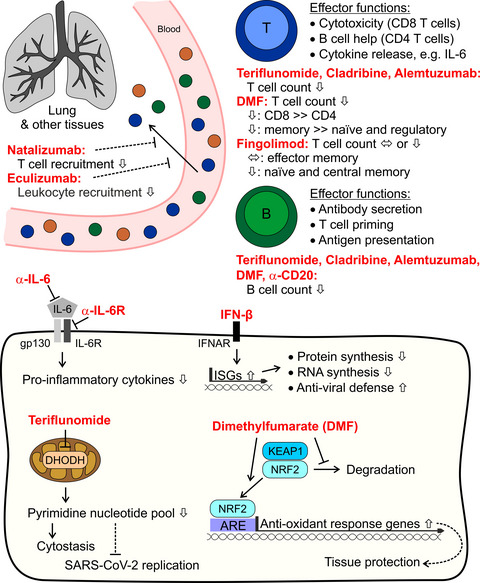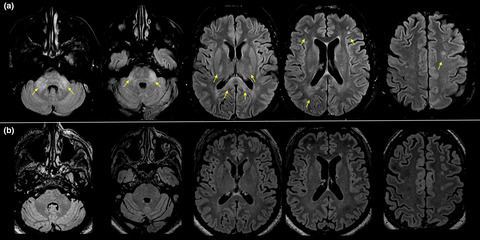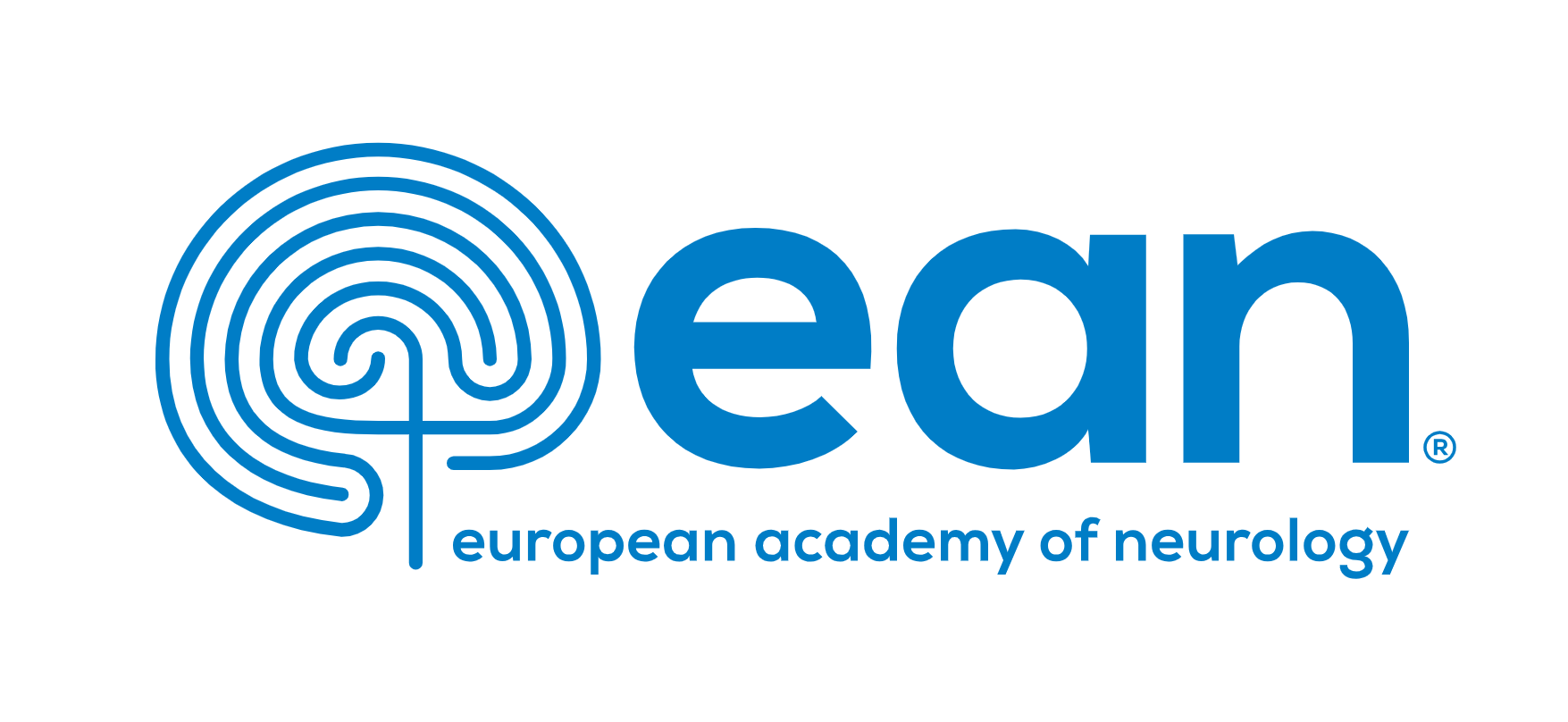Journal list menu
Export Citations
Download PDFs
Issue Information
All neurologists
COVID-19: An unforgettable challenge for the neurology community
- Pages: 3221-3222
- First Published: 25 May 2021
SARS-CoV-2 vaccine-related neurological complications need large collaborative studies, not single case reports or small descriptive series
- Page: 3223
- First Published: 09 May 2021
Stroke
Infectious Diseases
Primary prevention of COVID-19: Advocacy for vaccination from a neurological perspective
- Pages: 3226-3229
- First Published: 01 January 2021
Systematic review of cases of acute myelitis in individuals with COVID-19
- Pages: 3230-3244
- First Published: 01 June 2021
Dementia and cognitive disorders
Cognitive decline among individuals with history of mild symptomatic SARS-CoV-2 infection: A longitudinal prospective study nested to a population cohort
- Pages: 3245-3253
- First Published: 11 February 2021
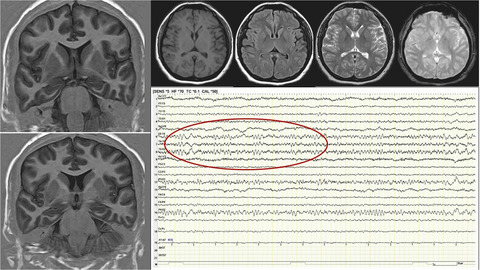
This population-based longitudinal prospective cohort study, conducted in a selected population of community-dwelling middle-aged and older adults living in a rural village severely struck by the SARS-CoV-2 pandemic, demonstrates that individuals with a history of mild symptomatic SARS-CoV-2 infections have more than 18 times the odds of developing late substantial cognitive decline than those without clinical and serological evidence of the infection.
Movement Disorders
Parkinson's disease patients' needs during the COVID-19 pandemic in a red zone: A framework analysis of open-ended survey questions
- Pages: 3254-3262
- First Published: 18 January 2021
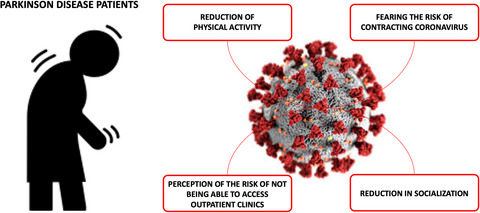
Parkinson's disease patients' needs during the COVID-19 pandemic in a red zone: A framework analysis of open-ended survey questions Francesco Cavallieri, Francesca Sireci, Valentina Fioravanti, Giulia Toschi, Vittorio Rispoli, Francesca Antonelli, Massimo Costantini, Luca Ghirotto*, Franco Valzania. The authors investigated the perceptions, feelings and unmet needs of Parkinson’s Disease patients who experienced a two-month lockdown in a “red zone” during the COVID-19 outbreak. A cross-section online survey was performed; framework analysis of the open-ended questions identified four main themes: fearing the risk of contracting coronavirus; the reduction of physical activity; the perception of the risk of not being able to access outpatient clinics or support services and the suffering from the important reduction in socialization.
Stroke
The impact of the COVID-19 outbreak on acute stroke care in Slovakia: Data from across the country
- Pages: 3263-3266
- First Published: 13 November 2020
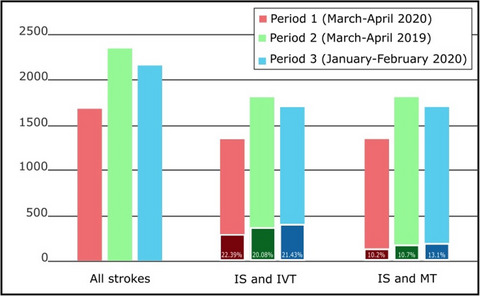
To the best of our knowledge this is the first published study from a whole country on the management of acute stroke during the COVID-19 pandemic. We found a decrease in the number of stroke patients admitted to hospital during the COVID-19 outbreak in Slovakia, but no difference was found in the rate of intravenous thrombolysis, mechanical thrombectomy, door-to-needle time and outcome (National Institutes of Health Stroke Scale, modified Rankin scale) at discharge from hospital.
Impact of the coronavirus disease 2019 pandemic on stroke teleconsultations in Germany in the first half of 2020
- Pages: 3267-3278
- First Published: 22 February 2021
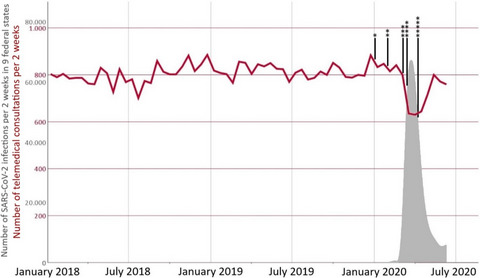
Telemedical stroke care in Germany was able to provide full service despite the COVID-19 pandemic, but telemedical consultations declined abruptly during the lockdown period and normalized after relaxation of COVID-19 measures in Germany. Although the majority of the participating network centers treated COVID-19 patients, relevant shortcomings regarding telemedical stroke care were not reported. Our representative nationwide study demonstrates the robustness of teleconsultation services in Germany during the COVID-19 pandemic in the first half of 2020.
Impact of the COVID-19 pandemic and a national lockdown on hospitalizations for stroke and related 30-day mortality in France: A nationwide observational study
- Pages: 3279-3288
- First Published: 19 March 2021
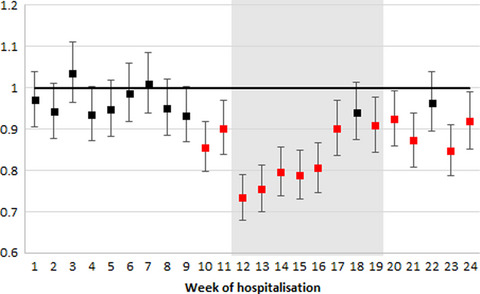
During the first weeks of the lockdown in France (March, 2020), rates of patients hospitalized for stroke fell by 30% and there were substantial increases of both in-hospital and out-of-hospital 30-day case fatality rates. Over these weeks, a greater decrease in the rates of patients hospitalized for stroke was observed in people aged over 85 years compared to the other age groups. By contrast, a higher increase in case fatality rates was found in hospitalized stroke patients aged under 65 years old. Stroke awareness in the general population should therefore be more intensively promoted during the COVID-19 pandemic.
Persistent visual dysfunction following posterior reversible encephalopathy syndrome due to COVID-19: Case series and literature review
- Pages: 3289-3302
- First Published: 11 June 2021
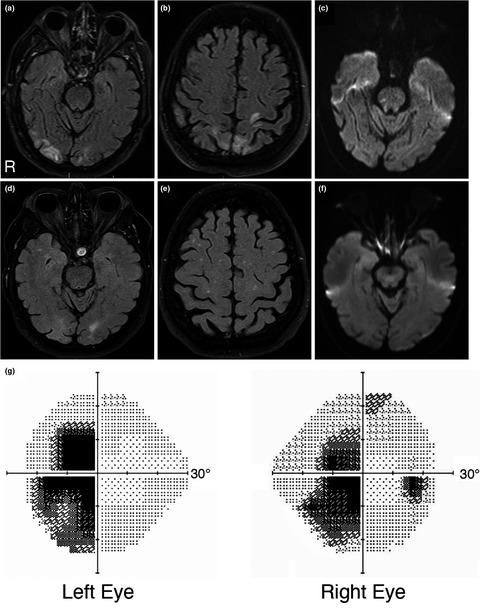
Posterior reversible encephalopathy syndrome (PRES) caused by COVID-19 has recently been associated with risk of development of long-term neurological sequelae. Here, we describe three cases of PRES in the context of COVID-19, two with visual dysfunction. We also discuss the neurological outcomes of internationally reported cases of PRES due to COVID-19 and their implications for care management.
Infectious Diseases
The European Academy of Neurology COVID-19 registry (ENERGY): an international instrument for surveillance of neurological complications in patients with COVID-19
- Pages: 3303-3323
- First Published: 21 November 2020
Biomarkers for central nervous system injury in cerebrospinal fluid are elevated in COVID-19 and associated with neurological symptoms and disease severity
- Pages: 3324-3331
- First Published: 28 December 2020
Differential effects of the SARS-CoV-2 pandemic on patients presenting to a neurological emergency room depending on their triage score in an area with low COVID-19 incidence
- Pages: 3332-3338
- First Published: 29 December 2020
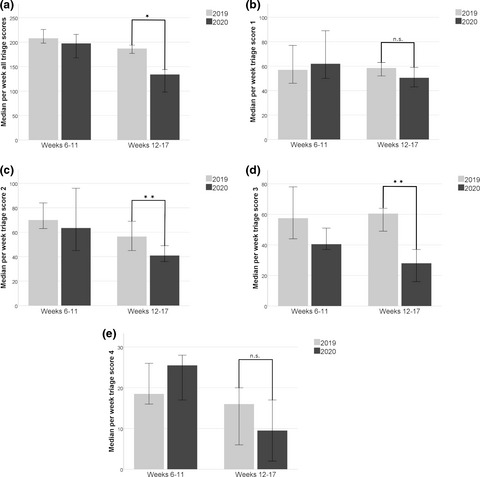
During the lockdown period in 2020, the number of patients presenting to a neurologic emergency room in Germany decreased. Presentation of patients with emergent symptoms remained constant, while fewer patients with urgent symptoms were presented. This may imply behavioral changes in care-seeking behavior.
Neurological complications of COVID-19 in hospitalized patients: The registry of a neurology department in the first wave of the pandemic
- Pages: 3339-3347
- First Published: 21 January 2021
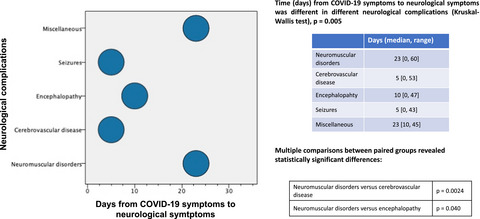
Description of the spectrum of neurological complications observed in a hospital-based cohort of COVID-19 patients during the first wave of the pandemic in a tertiary hospital in Madrid (Spain). The prevalence of neurological complications was low. Different mechanisms appear to be involved; however, there was no evidence of direct invasion of the nervous system. Some of the neurological complications can be classified into early and late neurological complications of COVID-19.
Neurological outcome and quality of life 3 months after COVID-19: A prospective observational cohort study
- Pages: 3348-3359
- First Published: 07 March 2021
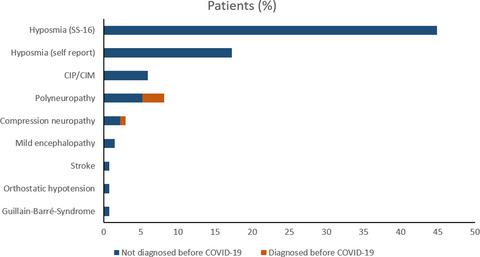
Three months after COVID-19, 20/135 patients (15%) presented with one or more neurological syndromes that were not evident before disease onset. Objective testing revealed hyposmia/anosmia in 45% of patients at the 3-month follow-up in comparison to 17% who reported hyposmia/anosmia. Cognitive deficits were apparent in 23%, quality of life was impaired in 31%, depression was found in 11%, anxiety in 25% and posttraumatic stress disorders in 11%.
Neuro-COVID frequency and short-term outcome in the Northern Portuguese population
- Pages: 3360-3368
- First Published: 21 April 2021
Multiple Sclerosis
Multiple sclerosis and COVID-19: How many are at risk?
- Pages: 3369-3374
- First Published: 25 September 2020
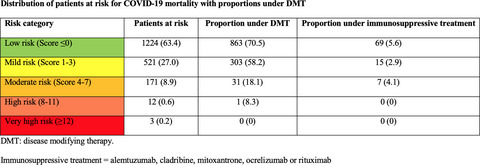
The coronavirus disease 2019 (COVID-19) pandemic challenges neurologists in counseling multiple sclerosis (MS) patients with respect to their risk by severe acute respiratory syndrome coronavirus 2 and in guiding disease-modifying treatment (DMT). Risk of COVID-19 mortality and the respective proportions of patients under DMT and immunosuppressive treatment according to mortality risk were analyzed in a population-based cohort of 1931 MS patients. Only 0.8% of MS patients displayed a high risk of COVID-19 mortality, with less than 1% of these patients receiving DMT or immunosuppressive therapy.
COVID-19 pandemic and mental distress in multiple sclerosis: Implications for clinical management
- Pages: 3375-3383
- First Published: 11 October 2020
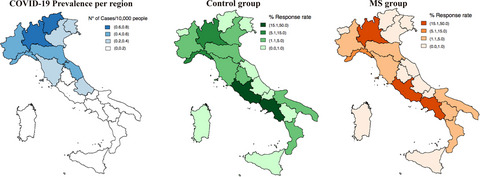
We used structural equation modeling to explore the relationship between mental distress, disability and coping strategies in the Italian population with multiple sclerosis (MS) under lockdown. A total of 845 people (497 with MS and 348 controls) participated in our web survey; in this population, the MS group had higher scores than the control group for depression (p = 0.005). According to the structural equation modeling, which explained 74% of the variance observed in depression scores, favoring exercise would enhance active attitude and its positive impact on mental well-being while, at the same time, reducing the negative impact of disability on depression, representing a valuable tool in facing COVID-19-related mental distress.
COVID-19 in multiple sclerosis patients: susceptibility, severity risk factors and serological response
- Pages: 3384-3395
- First Published: 19 December 2020
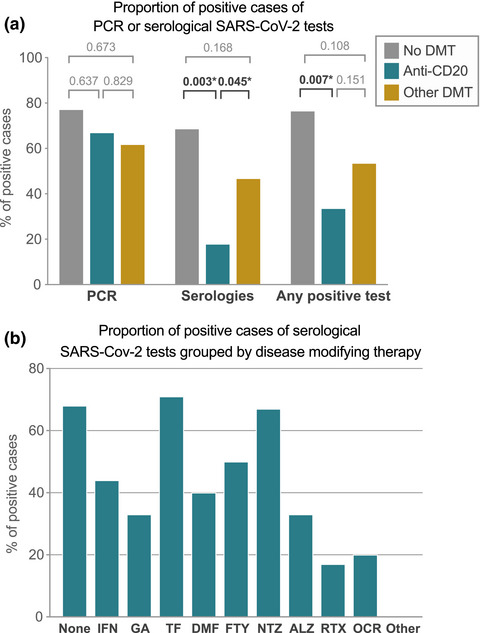
This was a study of a Catalan multiple sclerosis (MS) cohort with the objective to describe the incidence and characteristics of MS patients with the 2019 novel coronavirus disease (COVID-19), to identify susceptibility and severity risk factors and to assess the proportion of positive severe acute respiratory syndrome coronavirus 2 (SARS-CoV-2) serologies according to disease-modifying treatments. The results show that MS patients present similar incidence, risk factors and outcomes for COVID-19 as the general population. Patients treated with an anti-CD20 therapy for a longer period of time might be at a higher risk of COVID-19 and less than 20% generate an antibody response.
Perceived stress and social support in a large population of people with multiple sclerosis recruited online through the COVID-19 pandemic
- Pages: 3396-3402
- First Published: 23 December 2020
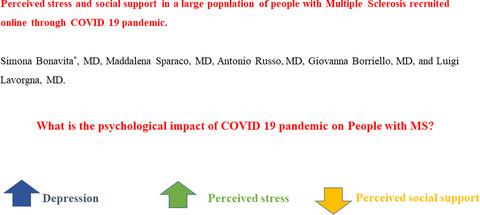
People with MS (pwMS) were web-surveyed for perceived stress, depression, perceived social support, habits and behaviour changes through the COVID-19 pandemic and compared to a control group. A higher proportion of pwMS were depressed, had a high level of perceived stress and felt significantly less social support compared to the control group. Neurologists taking care of pwMS should be aware of the emotional distress that pwMS experience during the COVID-19 pandemic and promote stress management measures.
Impact of the COVID-19 pandemic on access to healthcare services amongst patients with multiple sclerosis in the Lazio region, Italy
- Pages: 3403-3410
- First Published: 25 April 2021
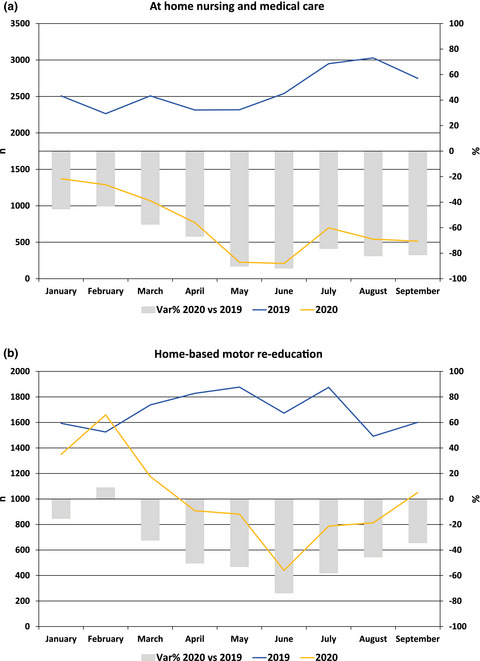
During the COVID-19 outbreak patients with multiple sclerosis experienced a substantial decrease in adherence to disease-modifying therapies and a remarkable reduction in the number of visits to ambulatory care practices and provision of healthcare services at home. Important year-to-year (2019 vs. 2020) variations were observed in May and June 2020 (respectively −90%, −92%) in nursing and medical care provision; even for home-based motor re-education the largest variations were observed in June (−74%). This study used healthcare administrative databases that allow healthcare delivery to be monitored and critical points in provision of and access to healthcare to be identified, in order to implement corrective measures.
Muscle and MNJ Disorders
Muscle involvement in SARS-CoV-2 infection
- Pages: 3411-3417
- First Published: 30 September 2020
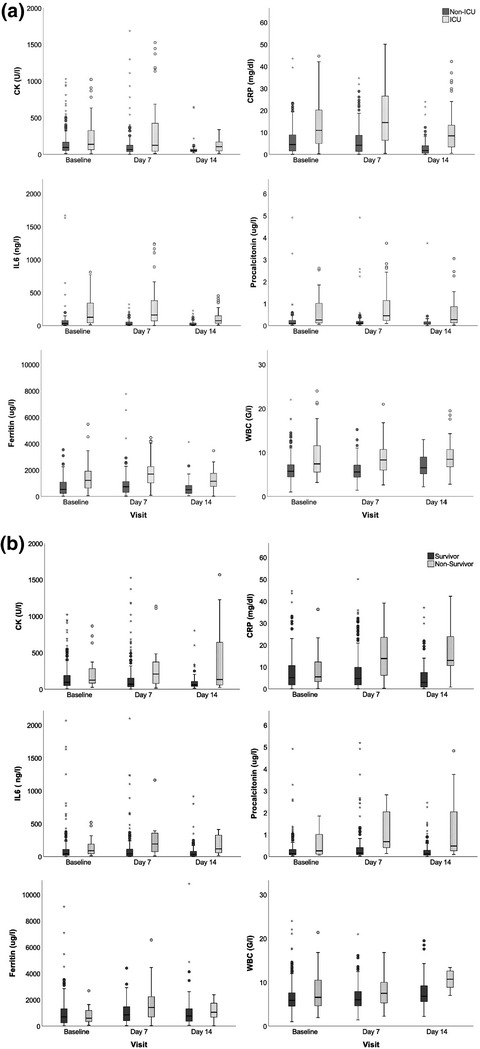
Creatine kinase (CK) levels were compared between mild and severe acute respiratory syndrome coronavirus-2 (SARS-CoV-2) and influenza cases. CK was higher in severe disease and higher in influenza as compared to COVID-19. Although the mechanisms are yet unknown, it appears that SARS-CoV-2 is less myotoxic than the influenza virus.
Predictive factors for a severe course of COVID-19 infection in myasthenia gravis patients with an overall impact on myasthenic outcome status and survival
- Pages: 3418-3425
- First Published: 03 June 2021
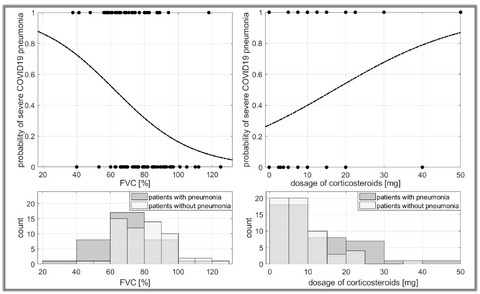
In this retrospective cohort study we observed 93 adult MG patients with COVID-19 infection and as the most important predictors of severe COVID-19 infection we identified unsatisfied condition of MG with lower forced vital capacity and previous long-term corticosteroid treament especially in higher doses, older age, the presence of cancer, and recent rituximab treatment. Immunosuppressive treatment in stable MG patients does not affect the course of COVID-19 infection and could lower risk of exacerbation of MG during COVID-19.
Headache
Headache during SARS-CoV-2 infection as an early symptom associated with a more benign course of disease: a case–control study
- Pages: 3426-3436
- First Published: 08 January 2021
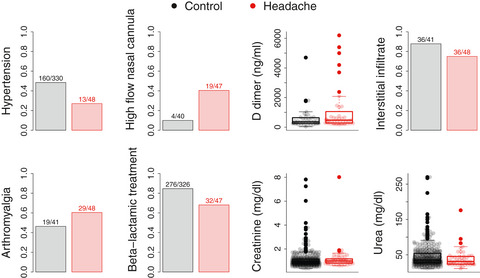
In a cohort of 379 hospitalized COVID-19 patients, headache was present in 13%, 62% of whom were men; the median age was 57.9 years. Headache in COVID-19 is associated with fewer basal comorbidities and a better prognosis. COVID-19-associated headache appears as an early symptom and as a novel headache with characteristics of acute headache attributed to systemic viral infection.
All neurologists
Neurology training and research in the COVID-19 pandemic: a survey of the Resident and Research Fellow Section of the European Academy of Neurology
- Pages: 3437-3442
- First Published: 23 December 2020
Neurocritical Care
Acute-onset delirium in intensive care COVID patients: association of imperfect brain repair with foodborne micro-pollutants
- Pages: 3443-3447
- First Published: 14 February 2021
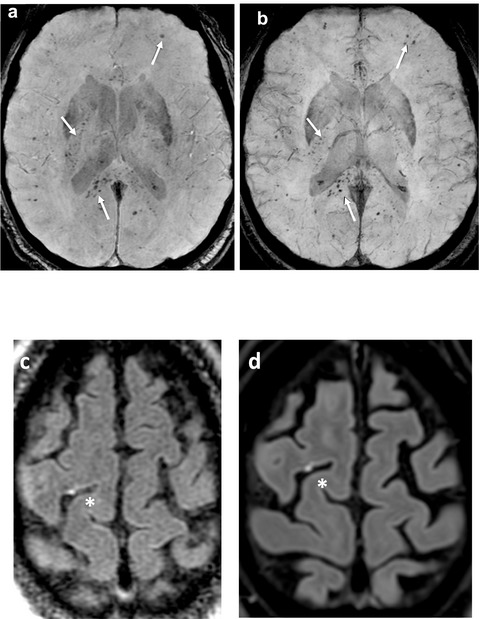
This explorative cohort study suggests that life-saving re-oxygenation of COVID+ patients is possibly followed by an incomplete brain repair as indicated by magnetic resonance imaging and low cerebrospinal fluid erythropoietin (CSF EPO) concentrations. In addition, non-targeted metabolomics analysis identified the presence of many perturbed metabolites during COVID-induced delirium, including biomarkers for the consumption of specific food and intermediate factors that have tangible impact on inflammatory pathways.
Chronic severe methanol intoxication after repeated mask cleansing due to fear of COVID-19: A new risk of coronaphobia
- Pages: 3448-3451
- First Published: 18 February 2021
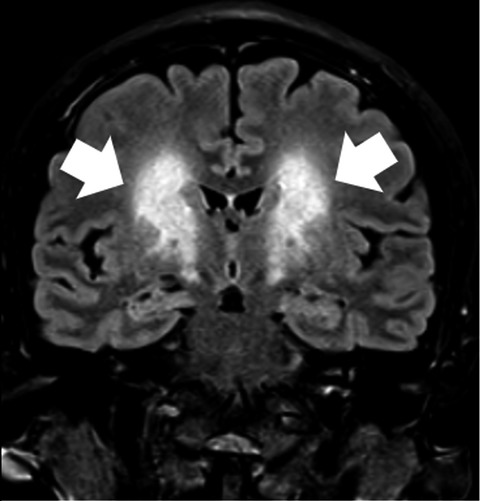
Disproportionate fear of contracting COVID-19 (coronaphobia) may result in inappropriate use of preventive measures that may in turn result in severe harm to an individual. A patient is described who developed bilateral basal ganglia damage after repeatedly cleaning her face mask with methanol, resulting in severe intoxication.
Stroke
Greater decline of acute stroke admissions compared with acute coronary syndromes during COVID-19 outbreak in Greece: Cerebro/cardiovascular implications amidst a second wave surge
- Pages: 3452-3455
- First Published: 08 December 2020
Delivering telemedicine consultations for patients with transient ischaemic attack during the COVID-19 pandemic in a comprehensive tertiary stroke centre in the United Kingdom
- Pages: 3456-3460
- First Published: 21 January 2021
Neuroimmunology
Outcomes of coronavirus disease 2019 in patients with neuromyelitis optica and associated disorders
- Pages: 3461-3466
- First Published: 26 October 2020
Movement Disorders
Factors associated with COVID-19 in people with Parkinson’s disease: a systematic review and meta-analysis
- Pages: 3467-3477
- First Published: 13 May 2021
Stroke
Cerebral venous thrombosis and severe acute respiratory syndrome coronavirus-2 infection: A systematic review and meta-analysis
- Pages: 3478-3490
- First Published: 11 January 2021
Infectious Diseases
Encephalitis as a neurological complication of COVID-19: A systematic review and meta-analysis of incidence, outcomes, and predictors
- Pages: 3491-3502
- First Published: 13 May 2021
Neuroimmunology
Immunology of COVID-19 and disease-modifying therapies: The good, the bad and the unknown
- Pages: 3503-3516
- First Published: 08 October 2020
Neuropathies
Prevalence, clinical characteristics and outcomes of Guillain−Barré syndrome spectrum associated with COVID-19: A systematic review and meta-analysis
- Pages: 3517-3529
- First Published: 09 April 2021
Infectious Diseases
Clinical and radiological features of severe acute respiratory syndrome coronavirus 2 meningo-encephalitis
- Pages: 3530-3532
- First Published: 15 September 2021
Acute cerebellar ataxia and myoclonus with or without opsoclonus: a para-infectious syndrome associated with COVID-19
- Pages: 3533-3536
- First Published: 25 January 2021
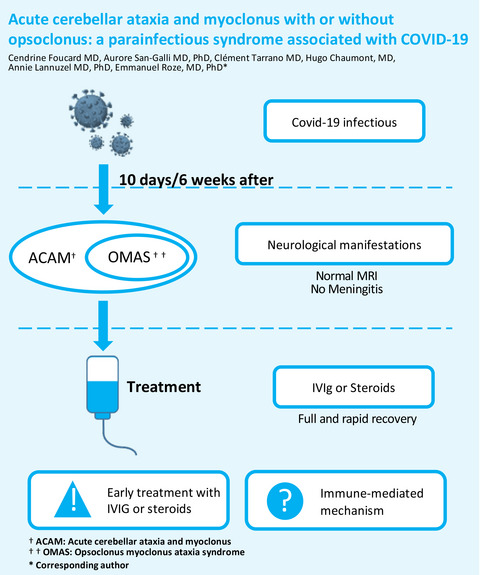
The cases of two patients with acute cerebellar ataxia and myoclonus (ACAM) associated with COVID-19 are reported and five previously reported patients are discussed. Patients were treated with intravenous immunoglobulins and/or steroids except for one patient, resulting in a striking improvement within a week. It is important to recognize this possible manifestation since early treatment allows for rapid recovery.
Muscle and MNJ Disorders
Myasthenia gravis associated with anti-MuSK antibodies developed after SARS-CoV-2 infection
- Pages: 3537-3539
- First Published: 09 January 2021

We present the case of myasthenia gravis (MG) developed 8 weeks after SARS-CoV-2 infection. The search for serum antibodies against AChR, MuSK (performed by radioimmunoassay), LRP4 (performed by immunohistochemistry), resulted negative, while anti-MuSK antibodies were detected by cell-based assay. A growing number of scientific reports suggest a correlation between SARS-CoV-2 infection and autoimmune diseases, such as MG. The interest of our case lies in the timing of the MG onset (after two months from infection), together with the unusual late onset of anti-MuSK MG. These features suggest that coronavirus infection may act as a trigger of the disease.
All neurologists
Botulinum toxin therapy during the COVID-19 outbreak: Experience of an Italian multidisciplinary team
- Pages: e71-e72
- First Published: 04 October 2020
Gender issues during the times of COVID-19 pandemic
- Pages: e73-e77
- First Published: 09 March 2021
Infectious Diseases
Importance of physical activity during and after the SARS-CoV-2/COVID-19 pandemic: A strategy for women to cope with stress
- Pages: e78-e79
- First Published: 28 May 2021
Muscle and MNJ Disorders
MuSK-positive myasthenia may be triggered not only by SARS-CoV-2
- Pages: e80-e81
- First Published: 09 March 2021
Response to: “MuSK-positive myasthenia may be triggered not only by SARS-CoV-2”
- Pages: e82-e83
- First Published: 17 March 2021
Neuropathies
COVID-19 provoking Guillain–Barré syndrome: The Bergamo case series
- Pages: e84-e85
- First Published: 22 September 2020




